2023 年北京高考英语真题及答案
第一部分 知识运用(共两节,30 分)
第一节(共 15 分)
阅读下面短文,掌握其大意,从每题所给的 A、B、C、D 四个选项中,选出最佳选项,并在答题卡上将该项
涂黑。
I was always timid(羞怯的). Being new to the school made me even ____1____ , so it was surprising
I’d ____2____ to anyone around me. Now I was paying the price﹣to write a five﹣page essay on
“Why I Should Not Talk in Class”. That would take all night!
After I got home, though. I took my time petting the cat﹣postponing the pain.
When I finally sat down to ____3____, I began with the reasons Ms Black would want to hear.
Talking kept me and my neighbours from ____4____. One paragraph down; now what? I chewed on
my pencil. Aha! What if talking were the first step towards life as a criminal? Without the education
I was throwing away, I’d turn to theft and go to prison. When I got out, people would say, “She
used to talk in class.” The pages began ____5____.
But when mum got home from work, I was still ____6____, “Five pages! That’s impossible!”
“Well, you’d better get back to work,” she said. “and I want to read it when you’re
through.”
Soon after dinner, I handed the essay to mum. I half expected a____7____﹣at least an “I
hope you’ve learned your lesson”. ____8____, mum laughed and laughed as she read.
The next day, when Ms Black read the essay to the class, everyone laughed. I could ____9____
they weren’t making fun of me: they laughed because I had the power to tell a funny story.
My____10____ still needed some nudging(激发), but I did learn I wasn’t shy in print.
1. A. freer
2. A. nod
3. A. weep
B. shyer
B. point
B. rest
C. calmer
C. listen
C. write
D. happier
D. chat
D. read
4. A. learning
B. playing
C. planning
D. laughing
5. A. standing out
B. flying by
C. breaking up
D. checking in
6. A. celebrating
B. longing
C. complaining
D. warning
7. A. lecture
B. reason
C. reward
D. solution
8. A. Therefore
B. Moreover
C. Meanwhile
D. Instead
�
9. A. hope
B. imagine
C. tell
D. predict
10. A. patience
B. confidence
C. tolerance
D. independence
第二节(共 15 分)
A
阅读下面短文,根据短文内容填空。在未给提示词的空白处仅填写 1 个恰当的单词,在给出提示词的空白
处用括号内所给词的正确形式填空。
Every culture is riddled with unwritten rules, such as ones on punctuality (守时). I’m British.
Soon after moving to Switzerland, I ____11____(throw) a house-warming party and was greatly
surprised when all 30 guests showed up ____12____(exact) on time. Years later, having moved to
France. I turned up at the appointed hour for a dinner, only to find that no other
guest____13____(arrive) and my hostess was still in her sleeping suit.
B
阅读下面短文,根据短文内容填空。在未给提示词的空白处仅填写 1 个恰当的单词,在给出提示词的空白
处用括号内所给词的正确形式填空。
Mangroves, known as “red forest” in China, grow between land and sea, characterised by their
complex roots. When ____14____(see) from afar, the mangrove forests appear more splendid.
Mangroves can help soften waves and protect ____15____(city) from coastal winds. For these
reasons, they are praised as “coastal guardians”. Up to now, China ____16____(establish) a number
of protected areas with mangroves.
C
阅读下面短文,根据短文内容填空。在未给提示词的空白处仅填写 1 个恰当的单词,在给出提示词的空白
处用括号内所给词的正确形式填空。
Nina has run marathons in 32 countries. All of her runs have a guiding purpose: to call attention
____17____ global water issues. Nina recently finished her year-long series of runs in Chicago,
____18____ thousands were attending a water conference.She called for action
____19____(address)the struggles of people around the world ____20____(face) “too little water
or too dirty water”. Her efforts have encouraged others to take part by running through a global
campaign called“Run Blue”.
第二部分 阅读理解(共两节,38 分)
第一节(共 28 分)阅读下列短文,从每题所给的 A、B、C、D 四个选项中,选出最佳选项,并在答题卡上将
该项涂黑。
�
The International Olympic Committee(IOC)Young Leaders programme empowers talents to make a
positive difference in their communities through sport. Twenty-five Young Leaders are being
selected every two years for a four-year period. They promote the Olympic values, spreading the
message of sport for good.
To be an IOC Young Leader, you need to first complete the 4-Week Learning Sprint (冲刺).
4-Week Learning Sprint
The 4-Week Learning Sprint, which will take place during November 2023, is a virtual learning
programme. The sessions can be attended live or watched back after they are made available on
the IOC channel. Each week, participants will be asked to complete a topic﹣specific reflection
task.
The 4-Week Learning Sprint is open to anyone, with the target audience aged between 20 and
28.
After successfully completing the 4-Week Learning Sprint, you will need to submit a plan for
a sport﹣based project, which you will work on if selected as an IOC Young Leader.
Requirements for the Applicants
•You have successfully completed the 4-Week Learning Sprint.
•You have completed your high school studies.
•You have at least one year of work experience.
•You have strong public speaking skills.
•You are self-motivated and committed.
•You are passionate about creating positive change in your community.
•You are open to being coached and advised by experts and peers (同伴).
•You are able to work with people from different backgrounds.
21. In the 4-Week Learning Sprint, participants will ________.
A. create change in their community
B. attend a virtual learning programme
C. meet people from different backgrounds
D. promote the IOC Young Leaders project
22. If selected as an IOC Young Leader, one will need to ________.
A. complete a reflection task each week
B. watch sports on the IOC channel
C. work on a sport-based project
D. coach and advise their peers
23. Which is a requirement for the applicants?
A. Spreading the message of sport for good.
B. Having at least one-year work experience.
�
C. Showing great passion for project planning. D. Committing themselves to becoming an expert.
Sitting in the garden for my friend’s birthday. I felt a buzz (振动) in my pocket. My heart
raced when I saw the email sender’s name. The email started off: “Dear Mr Green, thank you for
your interest” and “the review process took longer than expected.” It ended with “We are sorry
to inform you…”and my vision blurred (模糊). The position—measuring soil quality in the Sahara
Desert as part of an undergraduate research programme — had felt like the answer I had spent
years looking for.
I had put so much time and emotional energy into applying, and I thought the rejection meant
the end of the road for my science career.
So I was shocked when, not long after the email, Professor Mary Devon, who was running the
programme, invited me to observe the work being done in her lab. I jumped at the chance, and a
few weeks later I was equally shocked—and overjoyed—when she invited me to talk with her about
potential projects I could pursue in her lab. What she proposed didn’t seem as exciting as the
original project I had applied to, but I was going to give it my all.
I found myself working with a robotics professor on techniques for collecting data from the
desert remotely. That project, which I could complete from my sofa instead of in the burning heat
of the desert, not only survived the lockdown but worked where traditional methods didn’t. In
the end, I had a new scientific interest to pursue.
When I applied to graduate school, I found three programmes promising to allow me to follow
my desired research direction. And I applied with the same anxious excitement as before. When
I was rejected from one that had seemed like a perfect fit, it was undoubtedly difficult. But
this time I had the perspective (视角) to keep it from sending me into panic. It helped that in
the end I was accepted into one of the other programmes I was also excited about.
Rather than setting plans in stone, I’ve learned that sometimes I need to take the
opportunities that are offered, even if they don’t sound perfect at the time, and make the most
of them.
24. How did the author feel upon seeing the email sender’s name?
A. Anxious.
B. Angry.
C. Surprised.
D. Settled.
25. After talking with Professor Devon, the author decided to ________.
A. criticise the review process
B. stay longer in the Sahara Desert
�
C. apply to the original project again
D. put his heart and soul into the lab work
26. According to the author, the project with the robotics professor was ________.
A. demanding
B. inspiring
C. misleading
D. amusing
27. What can we learn from this passage?
A. An invitation is a reputation.
B. An innovation is a resolution.
C. A rejection can be a redirection.
D. A reflection can be a restriction.
In recent years, researchers from diverse fields have agreed that short-termism is now a
significant problem in industrialised societies. The inability to engage with longer-term causes
and consequences leads to some of the world’s most serious problems: climate change, biodiversity
collapse, and more. The historian Francis Cole argues that the West has entered a period where
“only the present exists, a present characterised at once by the cruelty of the instant and by
the boredom of an unending now”.
It has been proved that people have a bias (偏向) towards the present, focusing on loud
attractions in the moment at the expense of the health, well-being and financial stability of
their future selves or community. In business, this bias surfaces as short-sighted decisions.
And on slow-burning problems like climate change, it translates into the unwillingness to make
small sacrifices (牺牲) today that could make a major difference tomorrow. Instead, all that
matters is next quarter’s profit, or satisfying some other near-term desires.
These biased perspectives cannot be blamed on one single cause. It is fair to say, though,
that our psychological biases play a major role. People’s hesitancy to delay satisfaction is
the most obvious example, but there are others.One of them is about how the most accessible
information in the present affects decisions about the future. For instance, you might hear someone
say: “It’s cold this winter, so I needn’t worry about global warming.”Another is that loud
and urgent matters are given too much importance, making people ignore longer-term trends that
arguably matter more. This is when a pop star draws far more attention than, say, gradual
biodiversity decline.
As a psychologist once joked, if aliens (外星人) wanted to weaken humanity, they wouldn’t
send ships; they would invent climate change. Indeed, when it comes to environmental
transformations, we can develop a form of collective “poor memory”, and each new generation
can believe the state of affairs they encounter is nothing out of the ordinary. Older people today,
for example, can remember a time with insect-covered car windscreens after long drives. Children,
�
on the other hand, have no idea that insect population has dropped dramatically.
28. The author quotes Francis Cole mainly to ________.
A. draw a comparison
B. introduce a topic
C. evaluate a statement
D. highlight a problem
29. What can be inferred from the last paragraph?
A. Climate change has been forgotten.
B. Lessons of history are highly valued.
C. The human mind is bad at noting slow change.
D. Humans are unwilling to admit their shortcomings.
30. What does the author intend to tell us?
A. Far-sighted thinking matters to humans.
B. Humans tend to make long-term sacrifices.
C. Current policies facilitate future decision-making.
D. Bias towards the present helps reduce near-term desires.
What is life? Like most great questions, this one is easy to ask but difficult to answer.
The reason is simple: we know of just one type of life and it’s challenging to do science with
a sample size of one. The field of artificial life-called ALife for short — is the systematic
attempt to spell out life’s fundamental principles. Many of these practitioners, so-called
ALifers, think that somehow making life is the surest way to really understand what life is.
So far no one has convincingly made artificial life. This track record makes ALife a ripe
target for criticism, such as declarations of the field’s doubtful scientific value. Alan Smith,
a complexity scientist, is tired of such complaints. Asking about “the point” of ALife might
be, well, missing the point entirely, he says. “The existence of a living system is not about
the use of anything.” Alan says. “Some people ask me, ‘So what’s the worth of artificial life?’
Do you ever think, ‘What is the worth of your grandmother?’”
As much as many ALifers hate emphasizing their research’s applications, the attempts to create
artificial life could have practical payoffs. Artificial intelligence may be considered ALife’s
cousin in that researchers in both fields are enamored by a concept called open-ended evolution
�
(演化). This is the capacity for a system to create essentially endless complexity, to be a sort
of “novelty generator”. The only system known to exhibit this is Earth’s biosphere. If the
field of ALife manages to reproduce life’s endless “creativity” in some virtual model, those
same principles could give rise to truly inventive machines.
Compared with the developments of Al, advances in ALife are harder to recognize. One reason
is that ALife is a field in which the central concept — life itself — is undefined. The lack
of agreement among ALifers doesn’t help either. The result is a diverse line of projects that
each advance along their unique paths. For better or worse, ALife mirrors the very subject it
studies. Its muddled (混乱的) progression is a striking parallel (平行线) to the evolutionary
struggles that have shaped Earth biosphere.
Undefined and uncontrolled, ALife drives its followers to repurpose old ideas and generated
novelty. It may be, of course, that these characteristics aren’t in any way surprising or singular.
They may apply universally to all acts of evolution. Ultimately ALife may be nothing special.
But even this dismissal suggests something:perhaps, just like life itself throughout the universe,
the rise of ALife will prove unavoidable.
31. Regarding Alan Smith’s defence of ALife, the author is
.
A. supportive
B. puzzled
C. unconcerned
D. doubtful
32. What does the word “enamored” underlined in Paragraph 3 most probably mean?
A. Shocked.
B. Protected.
C. Attracted.
D. Challenged.
33. What can we learn from this passage?
A. ALife holds the key to human future.
B. ALife and AI share a common feature.
C. AI mirrors the developments of ALife.
D. AI speeds up the process of human evolution.
34. Which would be the best title for the passage?
A. Life Is Undefined. Can AI Be a Way Out?
B. Life Evolves. Can AI Help ALife Evolve, Too?
C. Life Is Undefined. Can ALife Be Defined One Day?
D. Life Evolves. Can Attempts to Create ALife Evolve, Too?
第二节(共 10 分)根据短文内容,从短文后的七个选项中选出能填入空白处的最佳选项,并在答题卡上将该
项涂黑。选项中有两项为多余选项。
It’s a joyful and stressful time of year in the United States for students and their families
�
as they make decisions about where to attend college. Families often turn to rankings systems
to help make a decision. ____35____
When I talk to families as a scholar of higher education, they’re often surprised that teaching
excellence is not counted in rankings. ____36____
Emerging research suggests that courses in lower-ranked universities, on average, scored
higher on teaching than courses in higher-ranked universities. ____37____ The absence of teaching
excellence from the rankings is surprising given the link between high-quality teaching and student
success. Quality teaching is one of the most important predictors of a wide range of college
outcomes.
Rankings, however, are only one reason why a low value is placed on teaching in higher education.
Administrators often don’t view teaching excellence as a way to increase enrolment (注册) or
funding. ____38____ Research shows that the more time instructors spend on teaching, the lower
their salary. What is the result? Many instructors continue to teach using traditional lectures,
which lead to lower success rates.
____39____ Nevertheless, not much will change until schools with high-quality teaching are
rewarded with more resources, higher rankings and increased enrolments. In the long term,
universities, organisations that rank schools, and others should work to make teaching a valued,
core part of the mission.
What should students and their families do? They should give strong consideration to
universities where high-quality teaching is valued, even though the schools may be ranked lower.
A. Higher education has achieved its true potential.
B. Therefore, it’s not highly valued in hiring or promotion.
C. Quality teaching has been an important reputation-building factor.
D. However, the rankings ignore a critical factor: the quality of teaching.
E. Efforts to improve teaching at the university level have recently emerged.
F. They’re even more surprised at how teaching is undervalued by universities.
G. In fact, universities often shift emphasis from teaching to other ranking factors.
第三部分 书面表达(共两节,32 分)
第一节(共 4 题;第(1)、(2)题各 2 分,第(3)题 3 分,第(4)题 5 分,共 12 分)
阅读下面短文,根据题目要求用英文回答问题。请在答题卡指定区域作答。
Habit formation is the process by which behaviours become automatic. People develop countless
�
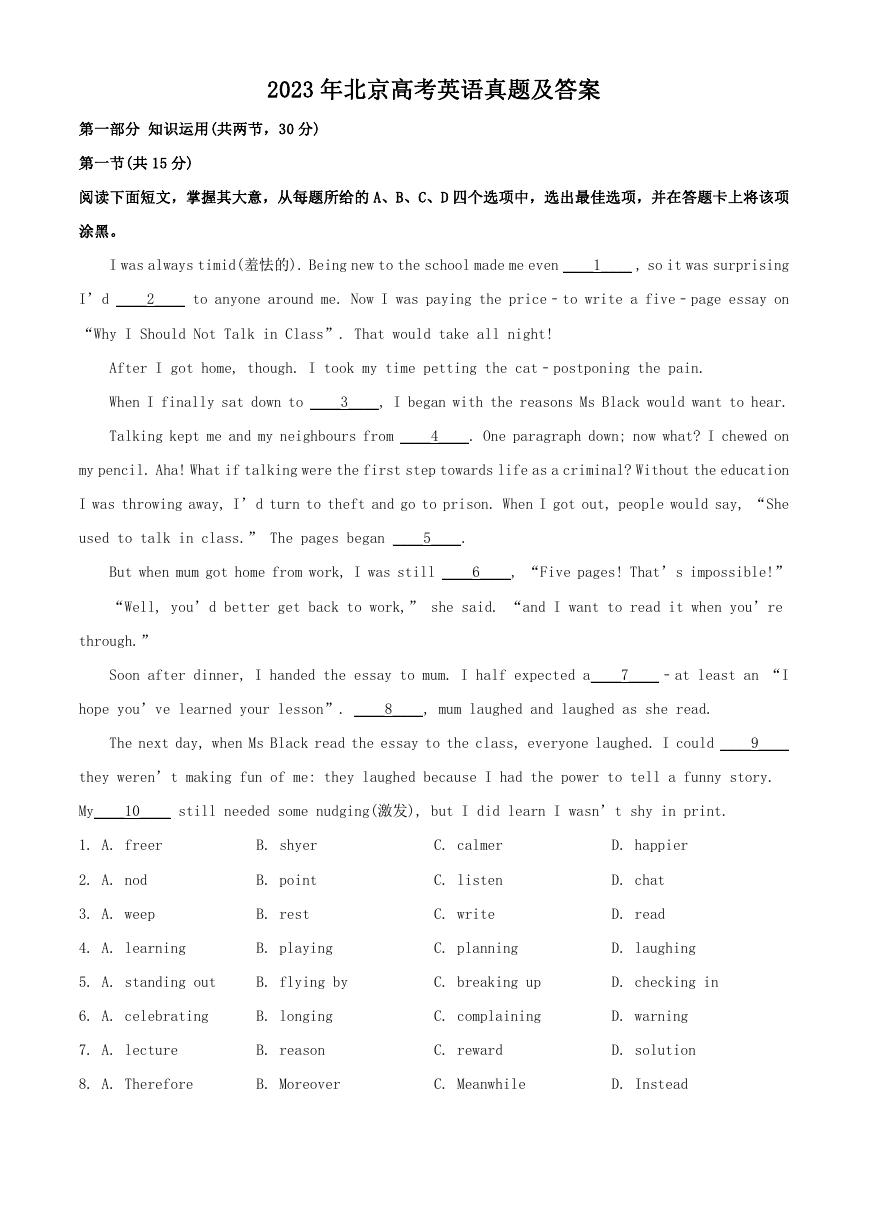
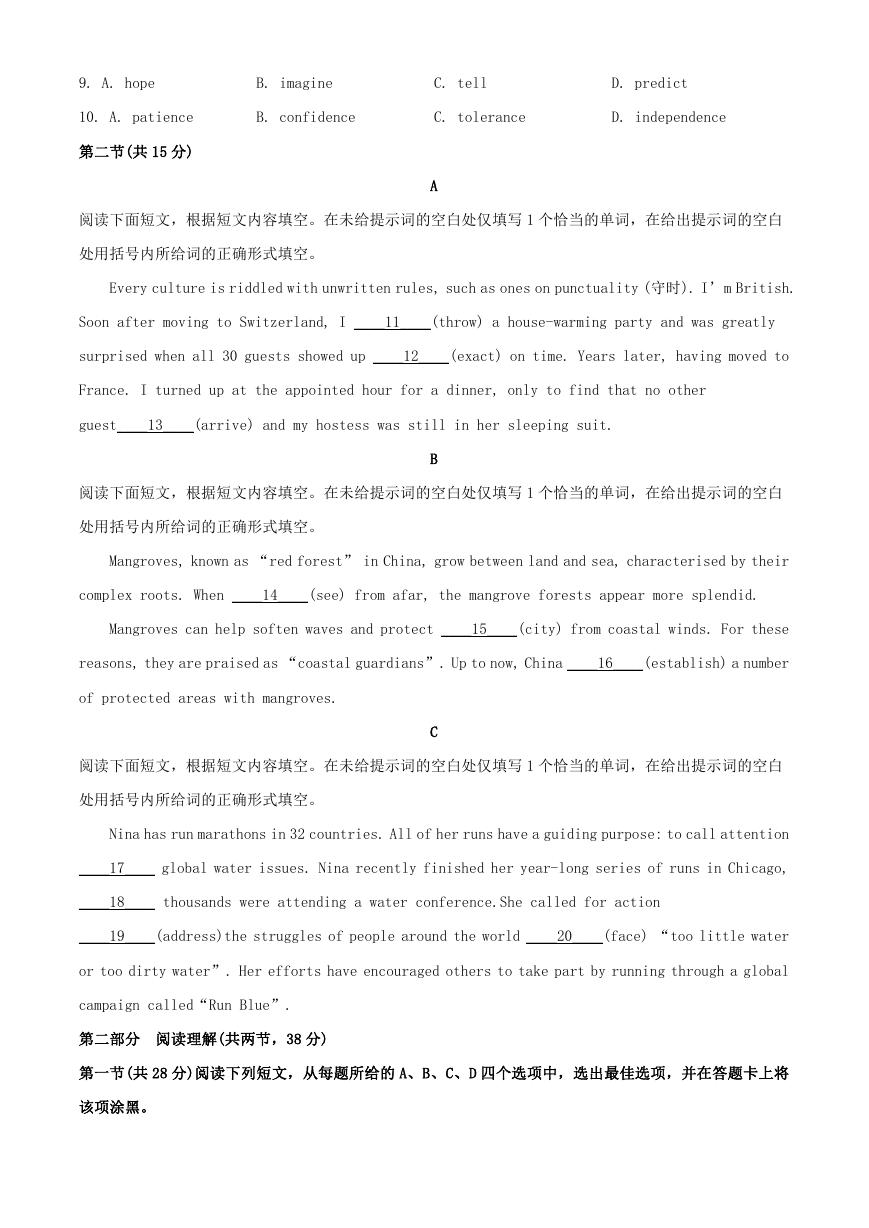
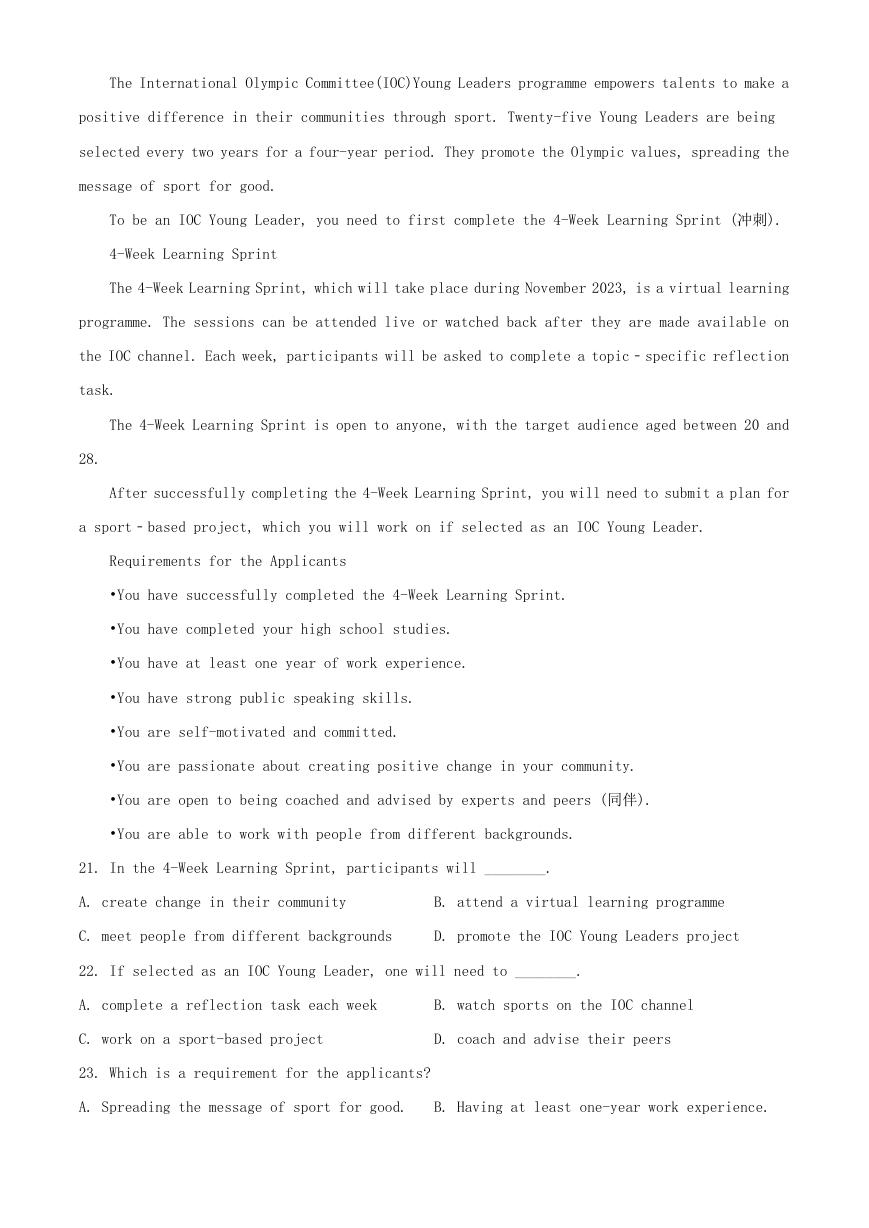
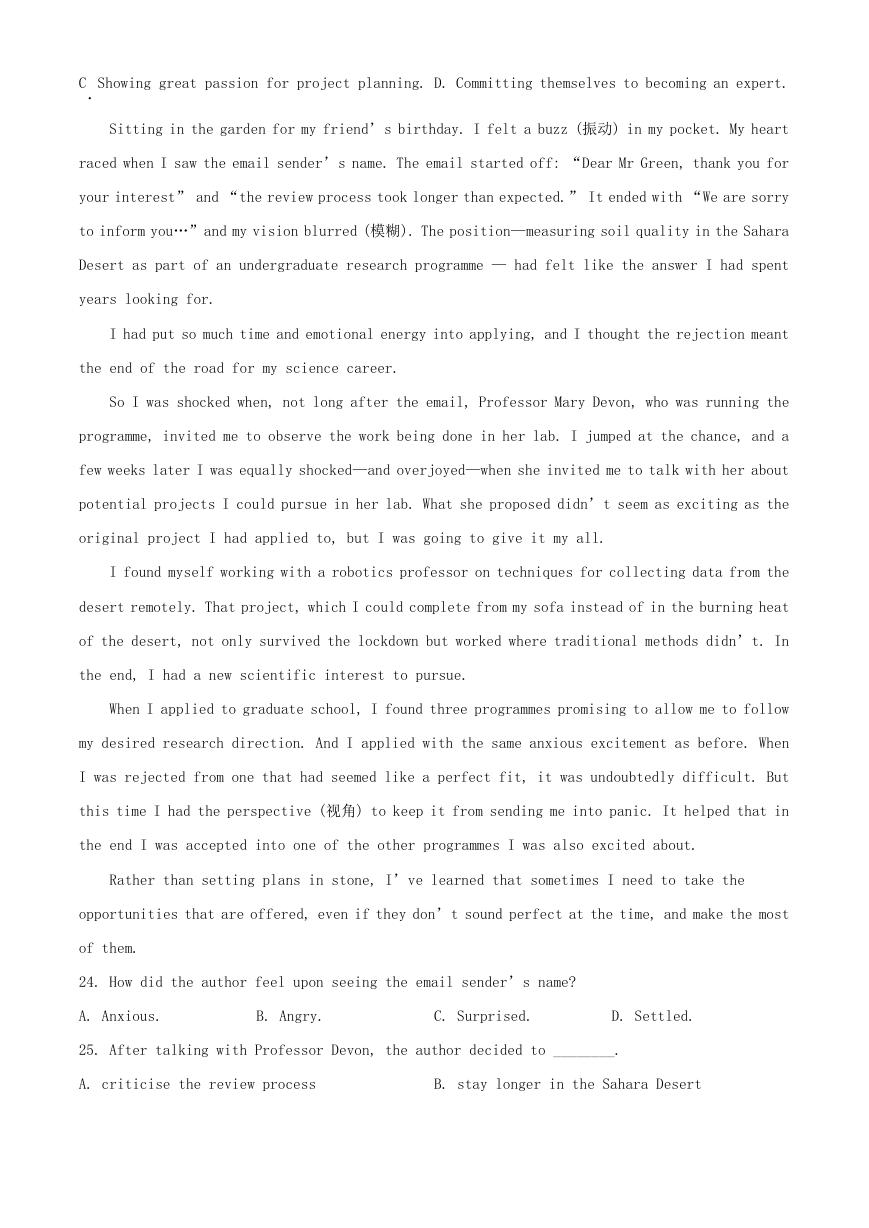
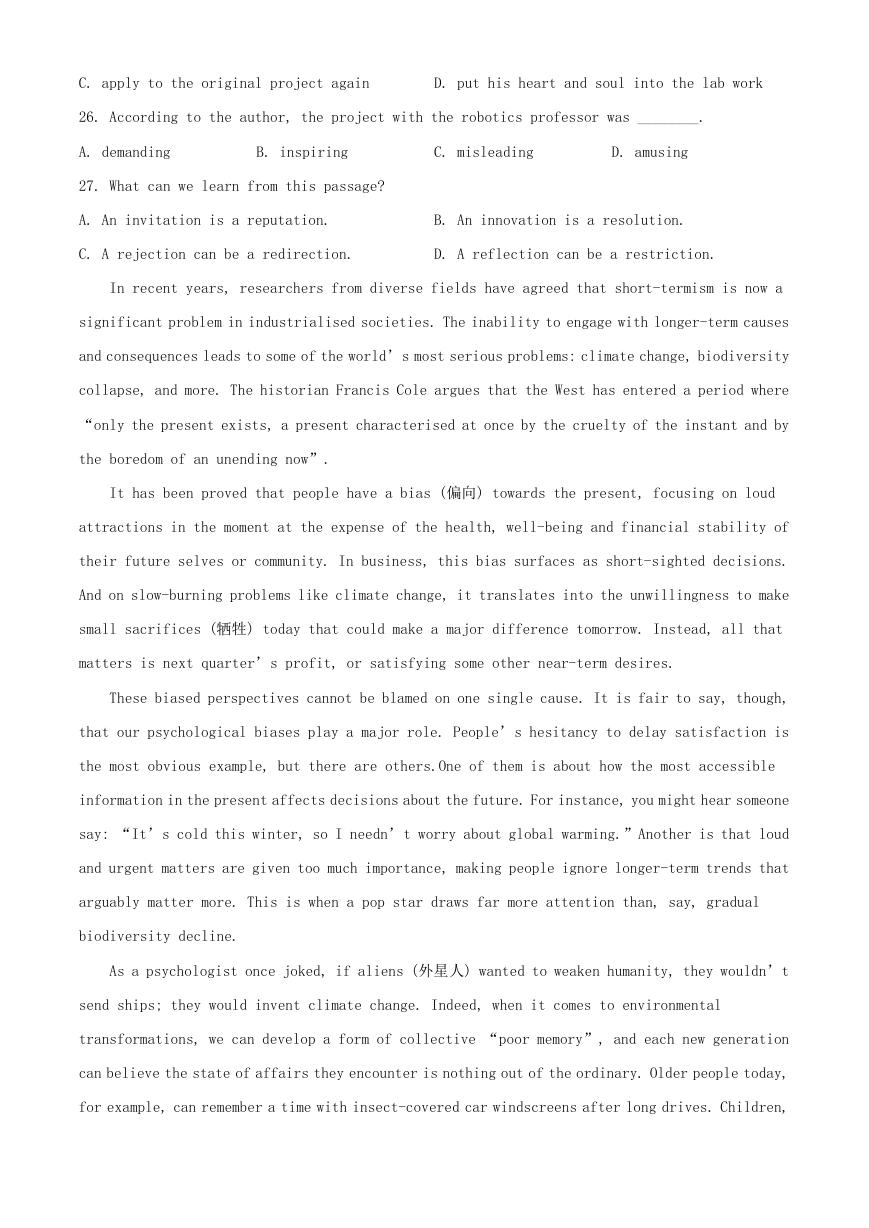
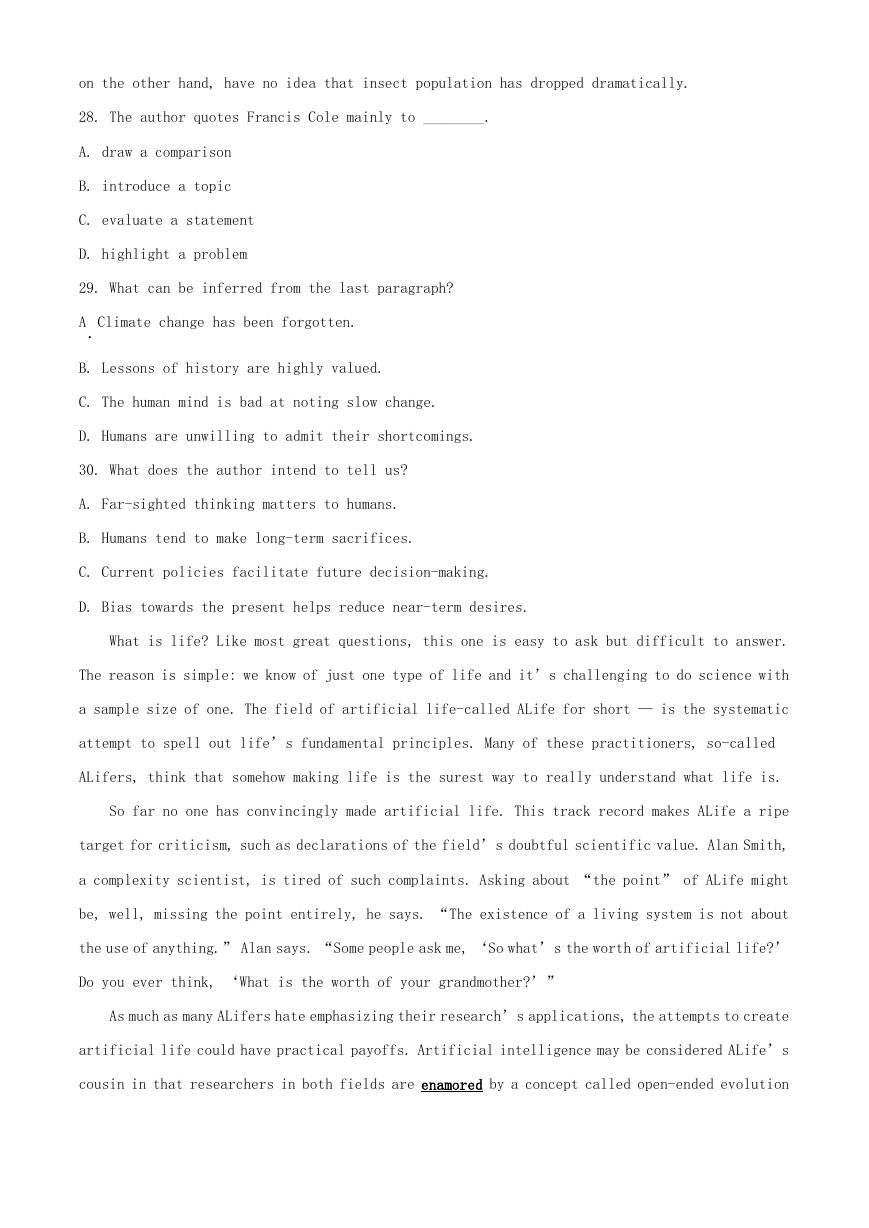

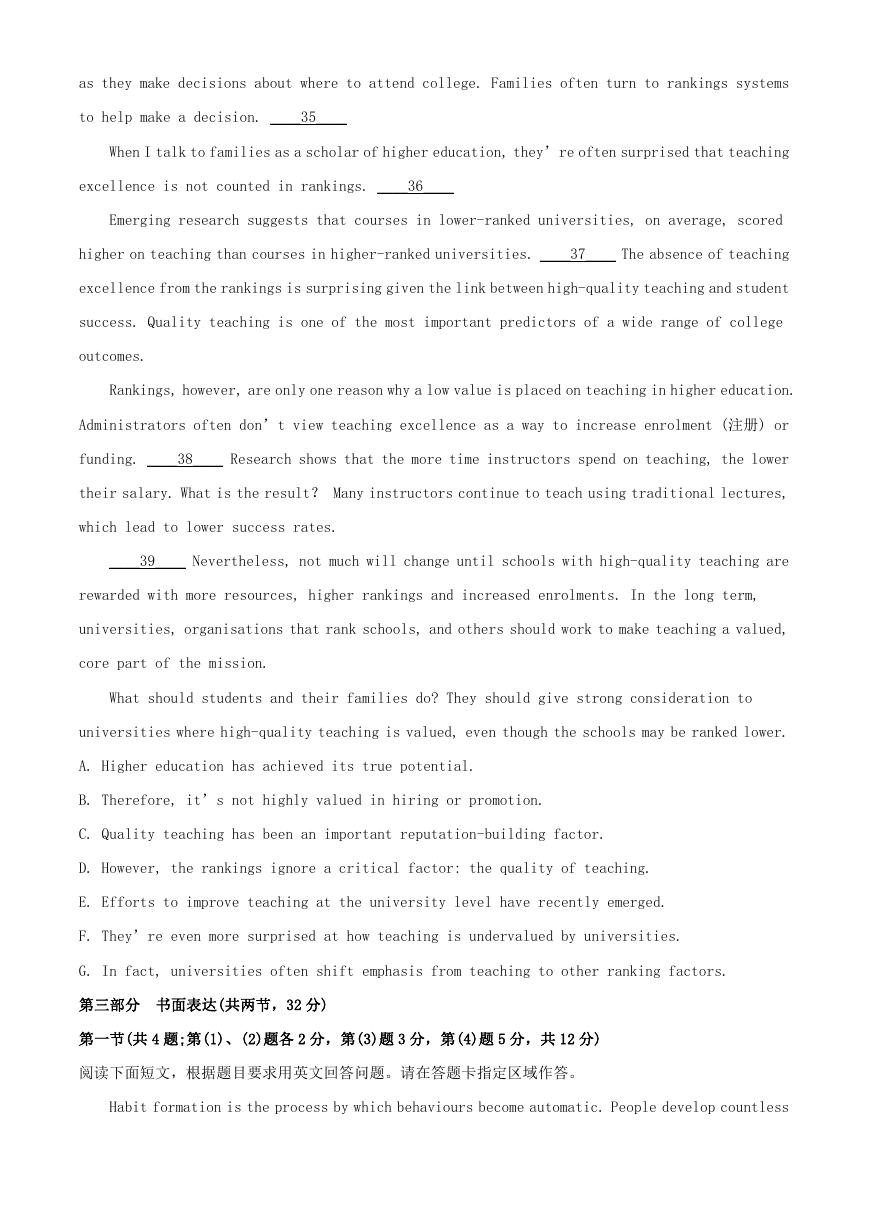








 2023年江西萍乡中考道德与法治真题及答案.doc
2023年江西萍乡中考道德与法治真题及答案.doc 2012年重庆南川中考生物真题及答案.doc
2012年重庆南川中考生物真题及答案.doc 2013年江西师范大学地理学综合及文艺理论基础考研真题.doc
2013年江西师范大学地理学综合及文艺理论基础考研真题.doc 2020年四川甘孜小升初语文真题及答案I卷.doc
2020年四川甘孜小升初语文真题及答案I卷.doc 2020年注册岩土工程师专业基础考试真题及答案.doc
2020年注册岩土工程师专业基础考试真题及答案.doc 2023-2024学年福建省厦门市九年级上学期数学月考试题及答案.doc
2023-2024学年福建省厦门市九年级上学期数学月考试题及答案.doc 2021-2022学年辽宁省沈阳市大东区九年级上学期语文期末试题及答案.doc
2021-2022学年辽宁省沈阳市大东区九年级上学期语文期末试题及答案.doc 2022-2023学年北京东城区初三第一学期物理期末试卷及答案.doc
2022-2023学年北京东城区初三第一学期物理期末试卷及答案.doc 2018上半年江西教师资格初中地理学科知识与教学能力真题及答案.doc
2018上半年江西教师资格初中地理学科知识与教学能力真题及答案.doc 2012年河北国家公务员申论考试真题及答案-省级.doc
2012年河北国家公务员申论考试真题及答案-省级.doc 2020-2021学年江苏省扬州市江都区邵樊片九年级上学期数学第一次质量检测试题及答案.doc
2020-2021学年江苏省扬州市江都区邵樊片九年级上学期数学第一次质量检测试题及答案.doc 2022下半年黑龙江教师资格证中学综合素质真题及答案.doc
2022下半年黑龙江教师资格证中学综合素质真题及答案.doc